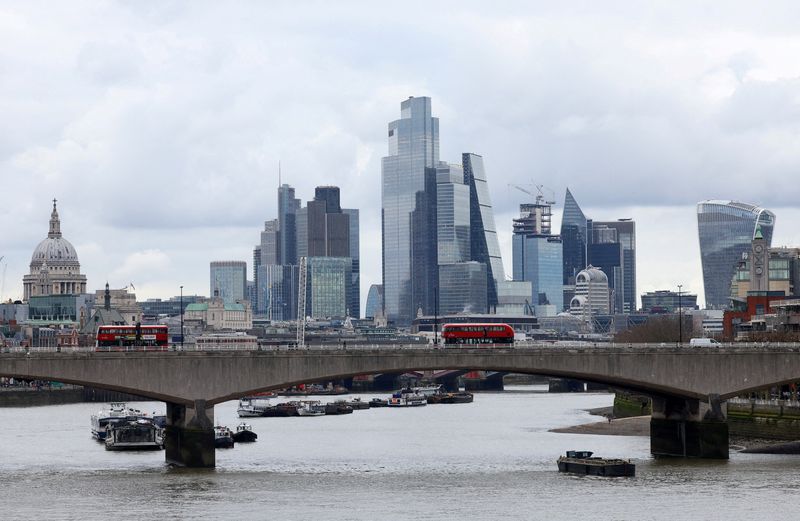By Sinead Cruise and Huw Jones
LONDON (Reuters) – Labour’s landslide election victory shows little sign of unrest in London’s financial heartland after the party’s long pro-business overtures, although many in the financial sector remain wary they could be targeted to to support the strained British public finances further down the line.
Under leader Keir Starmer, the Labor Party has diligently courted the City of London, as the financial district is known, realizing that its plans to boost economic growth will require a large dose of private capital.
“To achieve Labour’s bold ambition to make Britain a clean energy superpower, private sector finance must play a central role,” said Chris Hayward, policy chair at the City of London Corporation, which manages the capital’s financial district, Friday.
The city, like hundreds of constituencies across Britain, switched from Conservative to Labor in Thursday’s election, in stark contrast to the last election in 2019, when Starmer’s predecessor Jeremy Corbyn laid out a radical manifesto to increase public investment by increase taxes on corporations and top companies. earners, resulting in Labour’s worst result since the 1930s.
“The key change is that there has been a major shift in Labor’s mentality towards the city in recent years,” William Wright, director of think tank New Financial, told Reuters.
“This is reflected in a strong sense of continuity in the ongoing reforms of capital markets and pensions,” said Wright.
Labour, whose Rachel Reeves, a former economist at the Bank of England, is set to become Britain’s Chancellor of the Exchequer, has backed the Conservative government’s post-Brexit Edinburgh reforms aimed at protecting the global competitiveness of the city.
The party has also promised an overhaul of the pensions and savings sector, which could help Britain’s capital markets and boost people’s financial resilience.
But there is also speculation about changes in the way capital gains and wealth are taxed, as well as Reeves’ plans to change the way private equity is taxed, which could hit hard.
Michael Moore, chief executive of private equity body BVCA, said Labor was, however, showing a willingness to back its “pro-business mood music with commitment to the substance”.
Reeves had promised to close a ‘loophole’ that would allow some private equity income to be taxed as capital gains, rather than at the higher income tax rate, but told the Financial Times last month that the favorable tax treatment would continue in cases where fund managers put their own capital at risk.
Analysts at JP Morgan said in a note on Friday that the new government was largely priced in on banking stocks such as NatWest and Barclays and would be broadly neutral on the sector.
However, the risk of a rise in capital gains tax meant that Labour’s victory was ‘somewhat negative’ for other listed financial companies such as Hargreaves Lansdown, Abrdn and Schroeders (LON:).
The pound and British shares and government bonds rose on Friday after Labour’s victory.
“The UK financial sector can take comfort in the fact that radical changes are unlikely to be on the horizon,” said Monique Melis, managing director at consultants Kroll.
SANGUINE AFTER BREXIT AND TRUSS
Many of Britain’s biggest financiers have adopted the prospect of a left-wing Labor government after the blow of Brexit and its impact on the UK government bond market in September 2022 from the plans of then Prime Minister Liz Truss – who lost her. seat on Thursday – for unfunded tax cuts.
“The industry has had positive and constructive conversations with Labor since 2019,” said Miles Celic, CEO of TheCityUK, which represents the UK financial sector globally.
Repairing the damage to investor confidence and leakage of financial services activity to the EU caused by Brexit – perhaps the most lasting legacy of the Conservative Party’s fourteen years in power – will be difficult for Labour.
France’s central bank said transactions between France-based financial services firms and the rest of the world last year would reach a record 10.4 billion euros in 2022 – double the volume at the time of the 2016 Brexit vote.
According to figures published by CityUK in January, Britain had a 16% share of cross-border bank lending in 2016, but this had fallen to 14% by the end of Q2 2023.
Meanwhile, Amsterdam has overtaken London as Europe’s leading share trading venue since euro-denominated share trading by EU investors had to be halted in Britain on December 31, 2020.
SECURITY AND STABILITY
Starmer has repeatedly made it clear that rejoining the single market, essential for the City to regain direct access to the EU, is a red line he will not cross.
Many market participants simply want the financial sector reforms already agreed to be properly implemented under Labor, to protect the industry’s huge contribution to the public purse.
A study by PwC for the City of London Corporation and TheCityUK, published in May, estimated the total tax contribution of the financial and related professional services sector at 110.2 billion pounds ($140 billion) in 2023.
This equates to 12.3% of total UK tax revenue, more than the UK government’s education budget, or more than half of the health care budget.
Impending changes to Britain’s stock market listing rules are aimed at bringing in more big IPOs, including possibly Chinese-founded fast-fashion retailer Shein, and other similar deals that will deliver big paydays for those involved.
The Financial Conduct Authority will publish the updated quotes after the election, which could trigger a flurry of business activity from the end of July.
The British economic environment remains fragile. Britain’s national debt is high, almost equal to GDP, with prospects for tepid growth, leading analysts to conclude that taxes will inevitably rise to support healthcare and other services, making the financial sector a potential target.
“It’s actually very simple: the business community wants certainty,” says Naresh Aggarwal, associate policy & technical director at the Association of Corporate Treasurers.
M&G Investments said in a note to clients that a Labor government is unlikely to fundamentally change the direction of the UK stock market, where valuations are lower than Wall Street.
But New Financial’s Wright warned that Labor may be more radical in government than in opposition, a view echoed by Samuel Gregg of the American Institute for Economic Research.
“The city should recognize that Labor is leaning more to the left today than it was in Tony Blair’s heyday,” Gregg said, speaking of the New Labor stronghold of the early 2000s.

“That cannot help but make life more precarious for the city under a majority Labor government.”
($1 = 0.7844 pounds)


